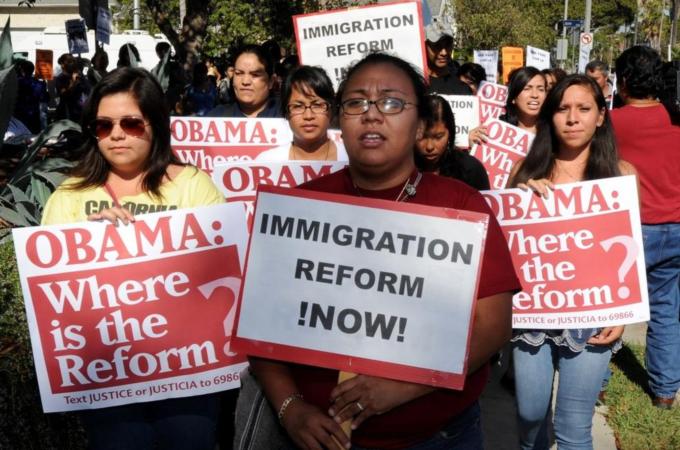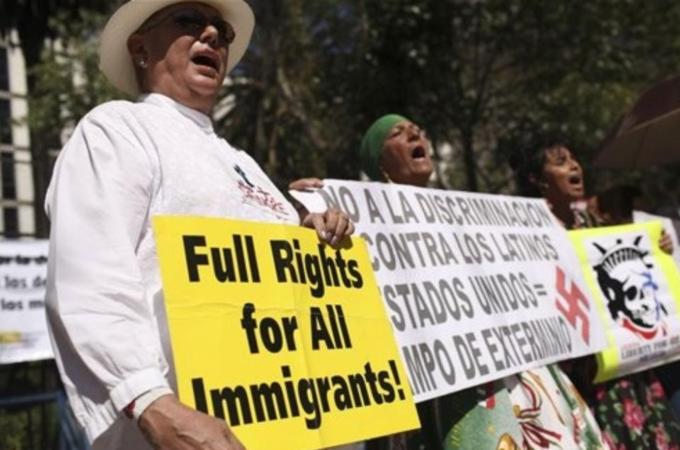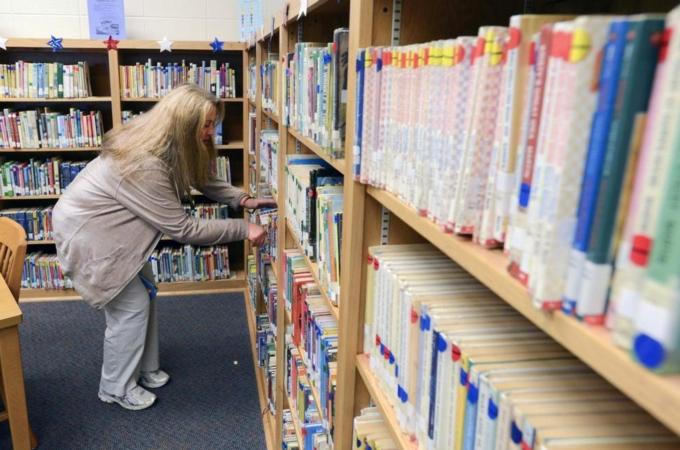In recent months, comprehensive immigration reform has become central to the political debate. Elected officials are in the process of developing the specifics of a law which will update current immigration system and address the 11 million undocumented individuals living in the US. Polls show that nearly 60 percent of Americans support immigration reform and the creation of a pathway to citizenship. Yet, we still do not know what this new law will look like. I believe that four provisions are key to making it a success:
Help people ‘waiting in line’: Address the visa backlog and amend visa caps
At present, US immigration policies are structured to promote family reunification. However, these policies were developed not so much as a way to value and strengthen families, but as a nativist tool to increase immigration opportunities to European-origin individuals.
When comprehensive immigration laws were developed and enacted in the mid-1900s, they sought to promote immigration from Europe by prioritising family-based petitions with opened pathways for migration for family members of US citizens, most of whom, at the time, had origins and thus family members in Europe.
In addition, they restricted immigration from non-European countries by limiting the number of visas available in each country. While these visa caps have been increased in the past, they still exist to limit immigration.
While there is no limit to visas available for the spouses, minor children and parents of citizens, there are limits on the number of visas available to the married children, siblings and extended family members of citizens as all family is sponsored by legal permanent residents. These limits mean that the “lines” for visas are extraordinarily long.
As of November 2012, 4.4 million people had been petitioned for and approved for a visa but are waiting for the availability of a visa. If you are lucky enough to be in one of the higher preference categories – an unmarried child of a US citizen – the wait averages seven years. However, demand in high migration countries creates backlogs so the wait reaches 15 years if you are from the Philippines and 20 if you are from Mexico.
While these numbers are dismal, they are worse for individuals lower on the preference categories. In fact, the longest wait time surpasses almost two lifetimes – 163 years for a citizen to reunite with a sibling from Mexico.
These wait times mean that undocumented migration is one of the few options open for individuals who do not want to be separated from family members for a lifetime. Additionally, it means that undocumented immigrants, who were fortunate enough to have family members petition for their legalisation upon their arrival, are still waiting for the availability of visas.
In the past, immigration reform has included increases to the number of visas available in each country. Similar steps to expand the visa pools are critical for the success of any comprehensive immigration reform bill. Though current proposals aim to clear this backlog, there needs to be consideration of how future backlogs will be prevented. Proposals for a shift away from family reunification to skill-based assessments could potentially reproduce these family-based backlogs, or worse deny visas and permanently separate families.

Help people who want to ‘get in line’: Eliminate the 10-year bar
While current immigration law provides pathways to legalisation for undocumented immigrants via the family reunification methods discussed above, many immigrants are dissuaded from even applying due to the complicated nature of this process.
Specifically, a 1996 immigration reform law enacted a 3- and 10-year bar process which requires individuals who entered “without inspection” (that is, without a visa) to return to their country of origin to obtain their visa. Once back, they face a 3-year bar to their return if their stay was less than one year and 10-year bar if their stay was longer.
While individuals can petition to lift this “bar” based on the undue hardship it will place on their citizen petitioners, it is a risky process with uncertain outcomes. As a result, many eligible undocumented immigrants choose not to apply for legalisation once they find out about the “bar”.
In recent months, comprehensive immigration reform has become central to the political debate. Elected officials are in the process of developing the specifics of a law which will update current immigration system and address the 11 million undocumented individuals living in the US. Polls show that nearly 60 percent of Americans support immigration reform and the creation of a pathway to citizenship. Yet, we still do not know what this new law will look like. I believe that four provisions are key to making it a success:
Help people ‘waiting in line’: Address the visa backlog and amend visa caps
At present, US immigration policies are structured to promote family reunification. However, these policies were developed not so much as a way to value and strengthen families, but as a nativist tool to increase immigration opportunities to European-origin individuals.
When comprehensive immigration laws were developed and enacted in the mid-1900s, they sought to promote immigration from Europe by prioritising family-based petitions with opened pathways for migration for family members of US citizens, most of whom, at the time, had origins and thus family members in Europe.
In addition, they restricted immigration from non-European countries by limiting the number of visas available in each country. While these visa caps have been increased in the past, they still exist to limit immigration.
While there is no limit to visas available for the spouses, minor children and parents of citizens, there are limits on the number of visas available to the married children, siblings and extended family members of citizens as all family is sponsored by legal permanent residents. These limits mean that the “lines” for visas are extraordinarily long.
As of November 2012, 4.4 million people had been petitioned for and approved for a visa but are waiting for the availability of a visa. If you are lucky enough to be in one of the higher preference categories – an unmarried child of a US citizen – the wait averages seven years. However, demand in high migration countries creates backlogs so the wait reaches 15 years if you are from the Philippines and 20 if you are from Mexico.
While these numbers are dismal, they are worse for individuals lower on the preference categories. In fact, the longest wait time surpasses almost two lifetimes – 163 years for a citizen to reunite with a sibling from Mexico.
These wait times mean that undocumented migration is one of the few options open for individuals who do not want to be separated from family members for a lifetime. Additionally, it means that undocumented immigrants, who were fortunate enough to have family members petition for their legalisation upon their arrival, are still waiting for the availability of visas.
In the past, immigration reform has included increases to the number of visas available in each country. Similar steps to expand the visa pools are critical for the success of any comprehensive immigration reform bill. Though current proposals aim to clear this backlog, there needs to be consideration of how future backlogs will be prevented. Proposals for a shift away from family reunification to skill-based assessments could potentially reproduce these family-based backlogs, or worse deny visas and permanently separate families.
Help people who want to ‘get in line’: Eliminate the 10-year bar
While current immigration law provides pathways to legalisation for undocumented immigrants via the family reunification methods discussed above, many immigrants are dissuaded from even applying due to the complicated nature of this process.
Specifically, a 1996 immigration reform law enacted a 3- and 10-year bar process which requires individuals who entered “without inspection” (that is, without a visa) to return to their country of origin to obtain their visa. Once back, they face a 3-year bar to their return if their stay was less than one year and 10-year bar if their stay was longer.
While individuals can petition to lift this “bar” based on the undue hardship it will place on their citizen petitioners, it is a risky process with uncertain outcomes. As a result, many eligible undocumented immigrants choose not to apply for legalisation once they find out about the “bar”.
Those individuals who choose to apply and risk being barred from the US have to return to their country of origin to file petitions with their consular office. In the Mexican case, this happens in Ciudad Juarez, a border city plagued by violence and death. Petitioners can wait for months to years for appointments and processing and often are separated from family members during this time.
Interviewing recently legalised young adults who had to travel to Mexico revealed that these stays often had significant emotional consequences. One man spoke about how he had to watch his son learn to talk via Skype. Another spoke of the post-traumatic stress he developed after spending a night hiding in his hotel room bathtub while there was a shoot-out outside.
On the other hand, individuals who are allowed to complete the legalisation process in the US, report fairly positive experiences with the immigration system. This suggests that the proposed immigration reform law should make provisions to eliminate this provision. Dropping the 3- and 10-year bars would allow, and in fact encourage, eligible individuals to legalise their status in a safe and streamlined manner. This would help to reduce the undocumented population by encouraging them to apply through some avenues that are already open.
Help people who want to legalise: Increase acdeptable Documents
The Immigration Reform and Control Act of 1986, or IRCA, was the most recent immigration law to create a pathway to legalisation. While it legalised approximately 1.6 million undocumented immigrants, some eligible individuals were unable to apply due to a lack of acceptable documents to prove their work status and length of time in the US.
This was a lot harder for undocumented women to do, as they tended to work in private homes as housekeepers and nannies – where their employers did not want to confirm their employment – and did not have bills or accounts in their names, because it was their husbands’ responsibility.
This historical fact suggests that finding documentation of an undocumented life is hard. Many undocumented individuals strive to leave no mark of their existence for fear of deportation. In addition, many have their accounts and/or bills set up under citizen family member or friend because having a social security number makes it easier to open these accounts.
Imagine if you spent most of your life paying in cash and had few, if any accounts, in your name. How would you prove that you have been somewhere? This is a consideration that needs to be addressed as the specifics of a legalisation pathway are developed.
A glimpse into how this can be successfully implemented can be taken from the Deferred Action for Childhood Arrivals programme which provides a 2-year deferral of deportation and access to a work permit for undocumented youth who entered before the age of 16 and are under the age of 31.
To prove their length of residence in the US, these young adults have been using a variety of documents – Facebook check-ins, gym records and receipts. Immigration officials have been open to these various types of non-traditional documents which have made it easier for many eligible individuals to apply.
The successful deployment of this Deferred Action programme suggests that future programmes should replicate its process. The proposed law should include such provisions to improve the current system
Help people become full members of society: Create a shorter path to citizenship
The current proposed immigration reform bill suggests that there will be a 13-year pathway to citizenship – a 10-year provisional residency followed by a 3-year permanent residency at which point they can apply for citizenship.
However, my discussions with undocumented young adults has made it clear that years of feeling socially rejected only makes them feel like they do not belong. Many feel that it becomes increasingly unlikely that these negative feelings will go away as they wait longer to legalise their status.
Longer wait times only serve to make sure that the people we intend to admit in the future will be less likely to act like full members of a society when we finally do admit them. While legalisation will help undocumented immigrants’ transition out of what some refer to as second-class citizenship, lengthened wait times will only strengthen their feelings that they are second-class citizens who do not belong in the US. This not only hurts immigrants, but it hurts US society as a whole.
Laura Enriquez is a doctoral candidate in sociology at the University California, Los Angeles, where she does research on the experiences of undocumented young adults. She is a dedicated scholar-activist in the US immigrant rights movement and is a contributor to the Huffington Post Latino Voices DREAMers Blog Series.








